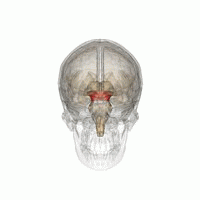
Photo from wikipedia
Changes in behavioral state can profoundly influence brain function. Here we show that behavioral state modulates performance in delay eyeblink conditioning, a cerebellum-dependent form of associative learning. Increased locomotor speed… Click to show full abstract
Changes in behavioral state can profoundly influence brain function. Here we show that behavioral state modulates performance in delay eyeblink conditioning, a cerebellum-dependent form of associative learning. Increased locomotor speed in head-fixed mice drove earlier onset of learning and trial-by-trial enhancement of learned responses that were dissociable from changes in arousal and independent of sensory modality. Eyelid responses evoked by optogenetic stimulation of mossy fiber inputs to the cerebellum, but not at sites downstream, were positively modulated by ongoing locomotion. Substituting prolonged, low-intensity optogenetic mossy fiber stimulation for locomotion was sufficient to enhance conditioned responses. Our results suggest that locomotor activity modulates delay eyeblink conditioning through increased activation of the mossy fiber pathway within the cerebellum. Taken together, these results provide evidence for a novel role for behavioral state modulation in associative learning and suggest a potential mechanism through which engaging in movement can improve an individual’s ability to learn.Albergaria et al. demonstrate that ongoing locomotor activity modulates cerebellum-dependent associative learning. Optogenetic circuit dissection reveals a site of locomotor modulation within the mossy fiber pathway in the cerebellum.
Journal Title: Nature neuroscience
Year Published: 2018
Link to full text (if available)
Share on Social Media: Sign Up to like & get
recommendations!